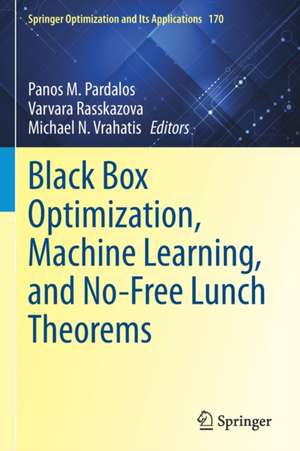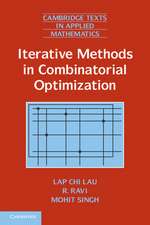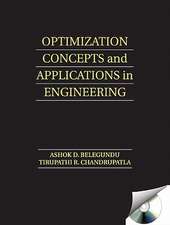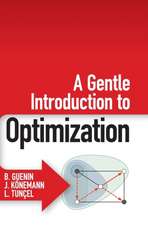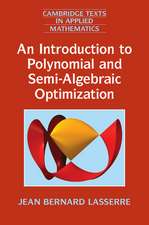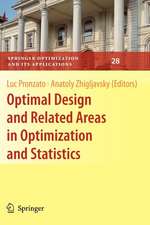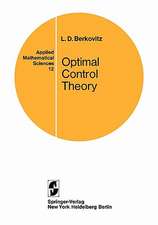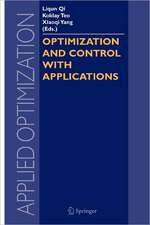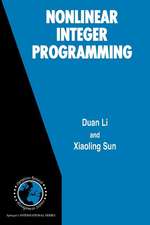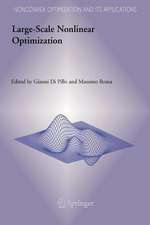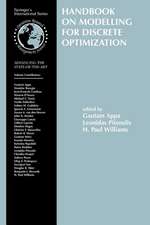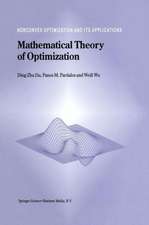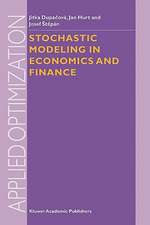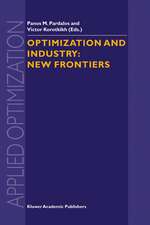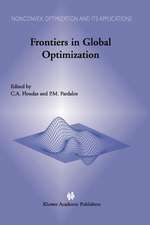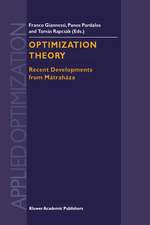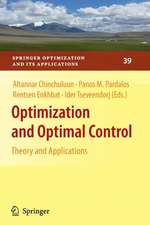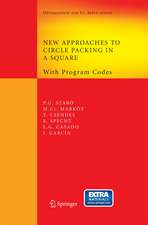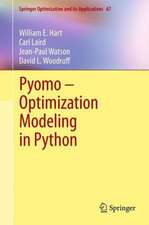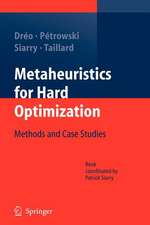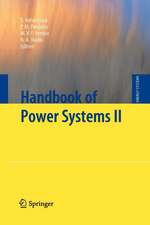Black Box Optimization, Machine Learning, and No-Free Lunch Theorems: Springer Optimization and Its Applications, cartea 170
Editat de Panos M. Pardalos, Varvara Rasskazova, Michael N. Vrahatisen Limba Engleză Paperback – 28 iun 2022
This edited volume illustrates the connections between machine learning techniques, black box optimization, and no-free lunch theorems. Each of the thirteen contributions focuses on the commonality and interdisciplinary concepts as well as the fundamentals needed to fully comprehend the impact of individual applications and problems. Current theoretical, algorithmic, and practical methods used are provided to stimulate a new effort towards innovative and efficient solutions. The book is intended for beginners who wish to achieve a broad overview of optimization methods and also for more experienced researchers as well as researchers in mathematics, optimization, operations research, quantitative logistics, data analysis, and statistics, who will benefit from access to a quick reference to key topics and methods. The coverage ranges from mathematically rigorous methods to heuristic and evolutionary approaches in an attempt to equip the reader with different viewpoints of the same problem.
| Toate formatele și edițiile | Preț | Express |
|---|---|---|
| Paperback (1) | 786.04 lei 6-8 săpt. | |
| Springer International Publishing – 28 iun 2022 | 786.04 lei 6-8 săpt. | |
| Hardback (1) | 792.19 lei 6-8 săpt. | |
| Springer International Publishing – 27 iun 2021 | 792.19 lei 6-8 săpt. |
Din seria Springer Optimization and Its Applications
- 15%
 Preț: 642.00 lei
Preț: 642.00 lei - 15%
 Preț: 664.61 lei
Preț: 664.61 lei - 18%
 Preț: 961.55 lei
Preț: 961.55 lei - 17%
 Preț: 360.79 lei
Preț: 360.79 lei - 13%
 Preț: 458.08 lei
Preț: 458.08 lei -
 Preț: 336.79 lei
Preț: 336.79 lei - 18%
 Preț: 787.91 lei
Preț: 787.91 lei - 17%
 Preț: 397.79 lei
Preț: 397.79 lei - 8%
 Preț: 337.37 lei
Preț: 337.37 lei - 18%
 Preț: 1133.30 lei
Preț: 1133.30 lei - 15%
 Preț: 646.43 lei
Preț: 646.43 lei - 15%
 Preț: 647.40 lei
Preț: 647.40 lei -
 Preț: 400.47 lei
Preț: 400.47 lei -
 Preț: 379.86 lei
Preț: 379.86 lei -
 Preț: 383.90 lei
Preț: 383.90 lei -
 Preț: 388.48 lei
Preț: 388.48 lei -
 Preț: 546.26 lei
Preț: 546.26 lei - 15%
 Preț: 647.40 lei
Preț: 647.40 lei -
 Preț: 390.25 lei
Preț: 390.25 lei - 15%
 Preț: 649.87 lei
Preț: 649.87 lei - 24%
 Preț: 611.55 lei
Preț: 611.55 lei - 18%
 Preț: 972.62 lei
Preț: 972.62 lei - 20%
 Preț: 585.91 lei
Preț: 585.91 lei - 15%
 Preț: 710.09 lei
Preț: 710.09 lei - 18%
 Preț: 742.61 lei
Preț: 742.61 lei - 15%
 Preț: 658.22 lei
Preț: 658.22 lei - 15%
 Preț: 659.02 lei
Preț: 659.02 lei - 18%
 Preț: 745.15 lei
Preț: 745.15 lei - 15%
 Preț: 705.34 lei
Preț: 705.34 lei
Preț: 786.04 lei
Preț vechi: 958.59 lei
-18% Nou
Puncte Express: 1179
Preț estimativ în valută:
150.40€ • 157.46$ • 124.45£
150.40€ • 157.46$ • 124.45£
Carte tipărită la comandă
Livrare economică 05-19 aprilie
Preluare comenzi: 021 569.72.76
Specificații
ISBN-13: 9783030665173
ISBN-10: 3030665178
Ilustrații: X, 388 p. 113 illus., 90 illus. in color.
Dimensiuni: 155 x 235 mm
Greutate: 0.56 kg
Ediția:1st ed. 2021
Editura: Springer International Publishing
Colecția Springer
Seria Springer Optimization and Its Applications
Locul publicării:Cham, Switzerland
ISBN-10: 3030665178
Ilustrații: X, 388 p. 113 illus., 90 illus. in color.
Dimensiuni: 155 x 235 mm
Greutate: 0.56 kg
Ediția:1st ed. 2021
Editura: Springer International Publishing
Colecția Springer
Seria Springer Optimization and Its Applications
Locul publicării:Cham, Switzerland
Cuprins
Learning enabled constrained black box optimization (Archetti).- Black-box optimization: Methods and applications (Hasan).- Tuning algorithms for stochastic black-box optimization: State of the art and future perspectives (Bartz-Beielstein).- Quality diversity optimization: A novel branch of stochastic optimization (Chatzilygeroudis).- Multi-objective evolutionary algorithms: Past, present and future (Coello C.A).- Black-box and data driven computation (Du).- Mathematically rigorous global optimization and fuzzy optimization: A brief comparison of paradigms, methods, similarities and differences (Kearfott).- Optimization under Uncertainty Explains Empirical Success of Deep Learning Heuristics (Kreinovich).- Variable neighborhood programming as a tool of machine learning (Mladenovic).- Non-lattice covering and quanitization of high dimensional sets (Zhigljavsky).- Finding effective SAT partitionings via black-box optimization (Semenov).- The No Free Lunch Theorem: What are its main implications for the optimization practice? ( Serafino).- What is important about the No Free Lunch theorems? (Wolpert).
Notă biografică
Panos M. Pardalos serves as distinguished professor of industrial and systems engineering at the University of Florida. Additionally, he is the Paul and Heidi Brown Preeminent Professor of industrial and systems engineering. Professor Pardalos is also an affiliated faculty member of the computer and information science department, the Hellenic Studies Center, and the biomedical engineering program. Additionally, he serves as the director of the Center for Applied Optimization. Professor Pardalos is a world leading expert in global and combinatorial optimization. His recent research interests include network design problems, optimization in telecommunications, ecommerce, data mining, biomedical applications, and massive computing. Panos Pardalos is a prolific author who lectures all over the world. He is the recipient of a multitude of fellowships and awards, the most recent of which is the Humboldt Research Award (2018).
Varvara A. Rasskazova is aResearcher and Senior Lecture in Moscow Aviation Institute. The area of scientific interests is discrete optimization and guaranteed approximation algorithms for solving transportation and assignment problems on Railway and Metallurgical Production. She is an active participant of regular international conferences on Operations Research and Mathematical Programming, and author of more than 40 publications.
Michael N. Vrahatis focuses on mathematics, natural computing and computational intelligence, global optimization, reliable computing and imprecise data, artificial neural networks and machine learning. He has participated in the organization of over 300 conferences serving at several positions, and participated in more than 240 conferences, congresses and advanced schools as active participant, speaker or keynote speaker. He has been a visiting research fellow in many different institutions including Cornell, MIT, CERN, and INRIA. He is a professor in the Department of Mathematics at the University of Patras since 2000. He is also serving as the director of the newly founded Institute of Artificial Intelligence of University of Patras. The corpus of his work consists of over 400 publications. According to Google Scholar his work has been cited more than 16000 times (h-index 56).
Textul de pe ultima copertă
This edited volume illustrates the connections between machine learning techniques, black box optimization, and no-free lunch theorems. Each of the thirteen contributions focuses on the commonality and interdisciplinary concepts as well as the fundamentals needed to fully comprehend the impact of individual applications and problems. Current theoretical, algorithmic, and practical methods used are provided to stimulate a new effort towards innovative and efficient solutions. The book is intended for beginners who wish to achieve a broad overview of optimization methods and also for more experienced researchers as well as researchers in mathematics, optimization, operations research, quantitative logistics, data analysis, and statistics, who will benefit from access to a quick reference to key topics and methods. The coverage ranges from mathematically rigorous methods to heuristic and evolutionary approaches in an attempt to equip the reader with different viewpoints of the same problem.
Caracteristici
Beginners will achieve an overview of optimization methods Researchers will gain access to to a useful reference on key topics Mathematical rigour and heuristics approaches equip the reader with different viewpoints on the same problem
